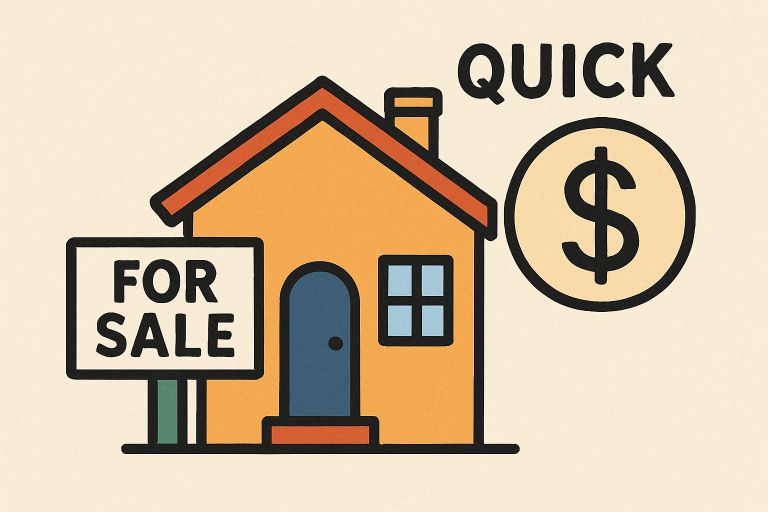Table of Contents
- Why More Homeowners Are Considering Cash Sales
- The Advantages Of A Cash Home Sale
- Evaluating Your Property’s Condition And Setting Expectations
- How The Cash Sale Process Works
- Cash Offers Vs. Traditional Listings: What’s Best For You?
- Preparing Your Home For A Cash Sale: Practical Advice
- Final Steps: Closing The Deal Smoothly
- Conclusion: Why Simplicity Matters In Today’s Housing Market
Why More Homeowners Are Considering Cash Sales
In today’s real estate market, an increasing number of homeowners are opting to bypass traditional sales and opt for the simplicity of selling for cash. This trend is driven by an increasing number of cash buyers, making the selling process easier and faster. Homeowners seeking to move quickly, avoid lengthy repairs, or sidestep uncertainty are finding these swift, straightforward transactions especially appealing. With solutions like fast close, sellers can move on their own timeline without the complications that often come with traditional listings.
Many sellers are motivated by life changes, financial needs, or the desire to quickly sell an inherited or distressed property. Others want to dodge the prospect of home showings, repairs, and the risk of deals falling through due to financing issues.
The Advantages Of A Cash Home Sale
Opting for a cash sale offers notable benefits over traditional methods, including quicker closings, greater certainty, and increased flexibility. Sellers can bypass lengthy preparations, showings, and contract contingencies. Real-world examples demonstrate that cash offers facilitate rapid relocations and enable the sale of older properties without the need for expensive repairs. When estimating your net proceeds, it’s essential to include all fees, particularly closing costs, which vary depending on your location and the specific transaction details.
Ultimately, a cash sale can streamline the selling process and offer peace of mind. Many sellers discover that the lower hassle and faster timeline outweigh any potential price difference. For many sellers, the ability to move forward swiftly and confidently makes a cash offer an attractive option.
Evaluating Your Property’s Condition And Setting Expectations
Selling as-is does not mean you have to settle for far less than your home is worth. Begin by assessing your property’s current condition and researching comparable sales in your area. According to U.S. News & World Report, cash buyers often purchase homes with the expectation of investing in repairs themselves, so you don’t need to assume significant upgrades are necessary before selling.
A common misconception is that only move-in-ready homes attract cash offers. In reality, cash buyers typically target homes that might need cosmetic or structural improvements, giving you an opportunity to sell properties that wouldn’t fare well on the MLS. Set realistic expectations: cash offers may come in slightly below market value, but the savings in time, stress, and repair costs often balance the equation.
How The Cash Sale Process Works
The roadmap to a cash sale is straightforward, focusing on efficiency and transparency. Here’s a typical sequence:
- Contact a reputable cash buyer or investor
- Schedule a property evaluation (virtual or in-person)
- Receive a no-obligation cash offer
- Review terms and negotiate if necessary
- Sign paperwork and agree on a closing date
- Close and receive funds, often within days
Cash Offers Vs. Traditional Listings: What’s Best For You?
Choosing between a cash offer and a traditional sale depends on your priorities. Factors to consider include timeline, convenience, overall profit, and the amount of effort you can invest in preparing your property. Here’s a comparison:
- Speed: Cash offers close within days or weeks; traditional sales may take months.
- Certainty: Cash deals usually have fewer contingencies; traditional offers often depend on financing and inspections.
- Expenses: Cash sales often involve fewer repairs and commissions, whereas listings may require upgrades and agent fees.
- Stress Level: Cash sales minimize disruptions and open houses, making life easier for busy homeowners.
- Sale Price: Traditional sales may fetch a higher price, but the added costs and time should be factored into the equation.
Preparing Your Home For A Cash Sale: Practical Advice
Even when selling as-is, minor fixes make a big difference. Replace burnt-out bulbs, tighten loose knobs, and patch minor wall damage. Cleanliness counts: a tidy home feels more inviting and can sway a buyer’s perception. Remove clutter, mow the lawn, and give your front door a quick refresh. These simple actions help maximize your offer without requiring a significant investment.
Final Steps: Closing The Deal Smoothly
As closing approaches, review the final paperwork carefully and communicate with your buyer or title company. Confirm the agreed-upon closing date and ensure you understand each document you sign. On closing day, bring your identification, any required keys or codes, and be ready to hand over possession smoothly. Being proactive and informed prevents last-minute surprises or delays.
Conclusion: Why Simplicity Matters In Today’s Housing Market
Selling your home for cash brings reliability, speed, and less stress—no matter your home’s condition. Take the time to evaluate the pros and cons, consider your situation, and choose the path that aligns with your timeline and needs. With options like cash sales now widely available, simplicity and peace of mind are accessible to every homeowner considering their next big move.

